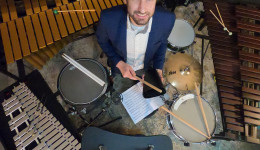Zac J




Instruments: Drums, Mallet Percussion, Music
Styles: Classical, Jazz, Pop, Rock, Swing, Marching Band


Zac J



Instruments: Drums, Mallet Percussion, Music
Styles:
Classical, Jazz, Pop, Rock, Swing, Marching Band
Where I Teach:
Ages Taught: 10-80
Master Degree: Miami University
WGI Gold Medalist, DCI Silver Medalist
Drum Corps International Scholarship Recipient 2012
Kappa Kappa Psi Most Inspirational Bandmember Award 2011
Zac J. is a percussion performer, teacher, and arranger. Zac has received a bachelor’s degree in music education and a master’s degree in music performance from Miami University with a focus in percussion. Zac has performed and studied with and learned from several artists such as Dr. William Albin, Pat Schleker, Dr. Christopher Tanner, and Michael LaMattina. While an undergrad, Zac performed with independent marching groups, including 2012 DCI silver medalist Carolina Crown and 2013 WGI gold medalist Rhythm X. Zac is recipient of several awards including the Friends of DCI Scholarship, the Lacey/Striple Highland Band and Drum Scholarship, and KKΨ Most Inspirational Band Member Award. Zac is a founding member of the Cincinnati Bengals “Growl” Drumline as well as director/founder of the Dayton Dragons Drumline. In addition to instructing at Cap City, Zac is currently the percussion director of Miamisburg High School, drumline teacher for Miami University, and a freelance performer and lesson instructor. This will be Zac’s sixth season with Cap City!
Currently, I am the Percussion Content Manager for MuseScore, a music tech company based out of Kaliningrad, Russia. Before the pandemic, I frequently performed with professional orchestras such as the Dayton Performing Arts Alliance and the Springfield Symphony Orchestra. I also teach lessons from my private studio in Dayton, Ohio (currently all virtual). I have four years of experience as a high school percussion director for two large and successful competitive programs: Kettering Fairmont High School and Miamisburg High School. With these programs, I have managed inventory, concert band ensemble placements, programming for solo & ensemble events, and coordinated with teams of instructional staff. In these positions, I also taught the middle school percussion sections. I have an excellent record as a student, holding both a Master of Arts in Percussion Performance and a Bachelor of Arts in Music Education from Miami University, receiving several honors and awards for academic excellence. I worked for Miami University both as a graduate assistant and a part-time employee. At Miami University, I instructed the marching band, pep band, and percussion methods classes. Also, I have Drum Corps International and Winter Guard International experience both as a performer (Carolina Crown and Rhythm X) and an instructor (Cap City Percussion and Colts Drum and Bugle Corps). I have even performed and taught internationally (Shanghai, China and Vilnius, Lithuania).
The primary responsibility of a music teacher is to cultivate music literacy; an understanding of music from both a fundamental and holistic standpoint. Fundamentals would include: technique, sight-reading, rhythms, scales, arpeggios, rudiments, chords, etc. Holistic concepts would include: music history, music theory, ear training, ethnomusicology, etc. My ultimate goal for all of my students is to help them become independent and enthusiastic musicians. I want them to be able to continue to learn and grow as musicians when their time under my instruction is over. In order to do this, I provide then with reliable resources and musical selections that will expand their horizons. Students should be pushed slightly outside their comfort zones so their musical ability and palate can grow.
Initially, assessment practices are used to determine what the students already know and what they are capable of. When selecting repertoire, it is important that the music is going to challenge the students, but not so difficult that the students will be unsuccessful. Besides difficulty, intellectual design is taken into account when selecting repertoire. It is valuable for students go beyond the basic execution of notes and rhythms. Concepts such as phrasing, balance, ensemble awareness, and musical expression should not be neglected. Once appropriate repertoire is selected, students are regularly assessed on their improvement and growth. I draw a great deal of my philosophy and pedagogy from outside sources and disciplines. Method books from world-renown artists and educators provide inspiration for my lesson plans. I often equate mastering music to mastering a foreign language; fluency resulting in mastery of vocabulary and communication. I also draw inspiration from the Alexander technique; regarding one’s body as part of the instrument, as well as cultivating effective practice and performance routines. Technology can be used to enrich the students’ learning experience. Videos and recordings give the student the opportunity to do self-evaluation with great detail and accuracy, improving their ability to grow into independent musicians. Tuners and metronomes are always on hand to keep tempo and pitch accuracy in check. The physical space and equipment have a crucial impact on the quality of learning that can occur. Students learn best in a clean space so they are able to focus. The sound environment should be dry enough so the students are able to hear themselves, the instructor, and the people they perform with clearly. Students will be most successful with reliable instruments that are capable of producing excellent tone. If students do not move on to professional music careers, their learning experience will still be valuable. Studying music is proven to have benefits for all people. Teamwork, responsibility, preparation, metacognition, self-discipline, and time management are only a few examples of the many life skills that students develop while learning music. Students should take these skills into whatever disciplines they pursue and experience more success.

